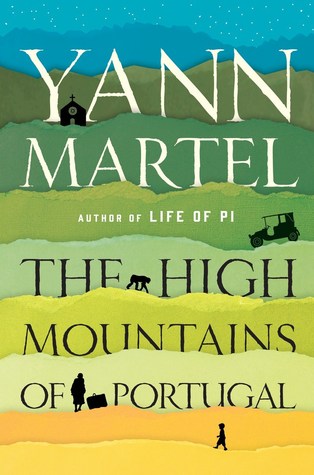We are risen apes, not fallen angels.I was able to get an ARC of The High Mountains of Portugal, so this review comes with two caveats: any passages I quote may not be as they appear in the final version of the book; and as I was consistently delighted/astounded by revelations along the way, it wouldn't be fair for me to spoil anyone else's reading experience by getting into too much detail; I'll try to be careful.
The High Mountains of Portugal is written in three parts, each of them focussing on a man who has experienced great loss. In the first section, set in the Lisbon of 1904, Tomás (whose grief-resultant quirk, when it is slowly revealed, was the first great delight for me in the book) is an archivist who decides to set off on a quest based on explosive information he discovers in the long-lost diary of a former slave-trading outpost's priest. Tomás' rich uncle owns one of the first cars in Portugal, and Tomás – who has been given the briefest of operating instructions – has a slapstick journey into the High Mountains of Portugal, involving stalls and misfires, the dumbfounded stares of villagers and flocks of sheep alike, a desperate road race against a coach-and-four, and the curious decision to use a bottle of gasoline as a candleholder. The slapstick is so unrelenting that it goes from ridiculous to sublime, and as it's interspersed with excerpts from the priest's diary, it seems a holy quest until it becomes clear that Tomás is in search of vengeance against God Himself. When Tomás reaches his goal (finally) and it is revealed what he had been seeking, I was wholly satisfied (I may even have said Wow out loud).
In the second part, we meet Eusebio; a pathologist working late on the New Year's Eve of 1938 in Bragança (a good sized town at the foot of the High Mountains of Portugal). His work is interrupted by a visit from his wife Maria; an outspoken and intelligent woman who is the center of Eusebio's world. Eusebio thinks, Maria ardently believes in the spoken word. To her, writing is making stock and reading is sipping broth, but only the spoken word is the whole roasted chicken, and so he listens to her speak. Maria has come to explain her most recent epiphany: the New Testament was written so long after Jesus' crucifixion intentionally so as to separate his parable-rich story from his mundane history because we humans most properly interpret our reality through storytelling.
A story is a wedding in which we listeners are the groom watching the bride coming up the aisle. It is together, in the act of imaginary consummation, that the story is born. The act wholly involves us, as any marriage would, and just as no marriage is exactly the same as another, so each of us interprets a story differently, feels for it differently. A story calls upon us as God calls upon us, as individuals –and we like that. Stories benefit the human mind. Jesus trod the earth with the calm assurance that he would stay with us and we would stay with him so long as he touched us through stories, so long as he left a fingerprint upon our startled imagination. And so he came not charging on a horse but quietly riding a story.Maria goes on to explain that she has discovered that their favourite author, Agatha Christie, seems to have also ascertained this basic truth about the gospels, and Maria provides examples from several of her most famous mysteries. When Maria leaves, another woman arrives, and what follows serves to further illuminate and demonstrate this basic thesis of parables and metaphors being the fundamental human language. (I don't want to get more specific than that, but I finished this section gobsmacked.)
The third section, set in 1981, follows Canadian Senator Peter Tovey as he flounders in the wake of his wife's sudden death. This part is set apart from the other two in that is seems totally literal – not the unbelievable series of events that Tomás endured or the curious sights that Eusebio witnessed – just a grief-stricken man seeking meaning in his life; a quest that leads him to the village in the High Mountains of Portugal from where his parents had emigrated when Peter himself was a toddler. Not to say that Peter doesn't do some odd things in this section – and there are satisfying parallels between his drive into Tuizelo that just so happens to retrace Tomás' journey seven decades earlier – but it feels like we have left the world of metaphor and are supposed to read this section as straight reporting; and most especially because Peter is the first post-religious, literally-minded character we meet. And this section was mostly interesting.
I think I understand what Yann Martel is trying to do with this trinity of writing styles and the repeated motifs (which I am loathe to reveal) and the closing of the circle. And, as always, Martel proves himself to be a deep thinker with a funny and profound slant on religion and storytelling and humanity. What makes this a four (and not a five) star read is the very final scene, which not only left me flat but served to remove what would have been the most obviously satisfying ultimate ending (and yes, I would agree that an author shouldn't go for the obvious ending, but in this case, I wanted it). Perhaps the ending as written just went over my head; I probably need a Japanese Actuary to explain it to me. The High Mountains of Portugal is a very good book and I wish Martel loads of success with it; he has once again left his fingerprint on my startled imagination.

